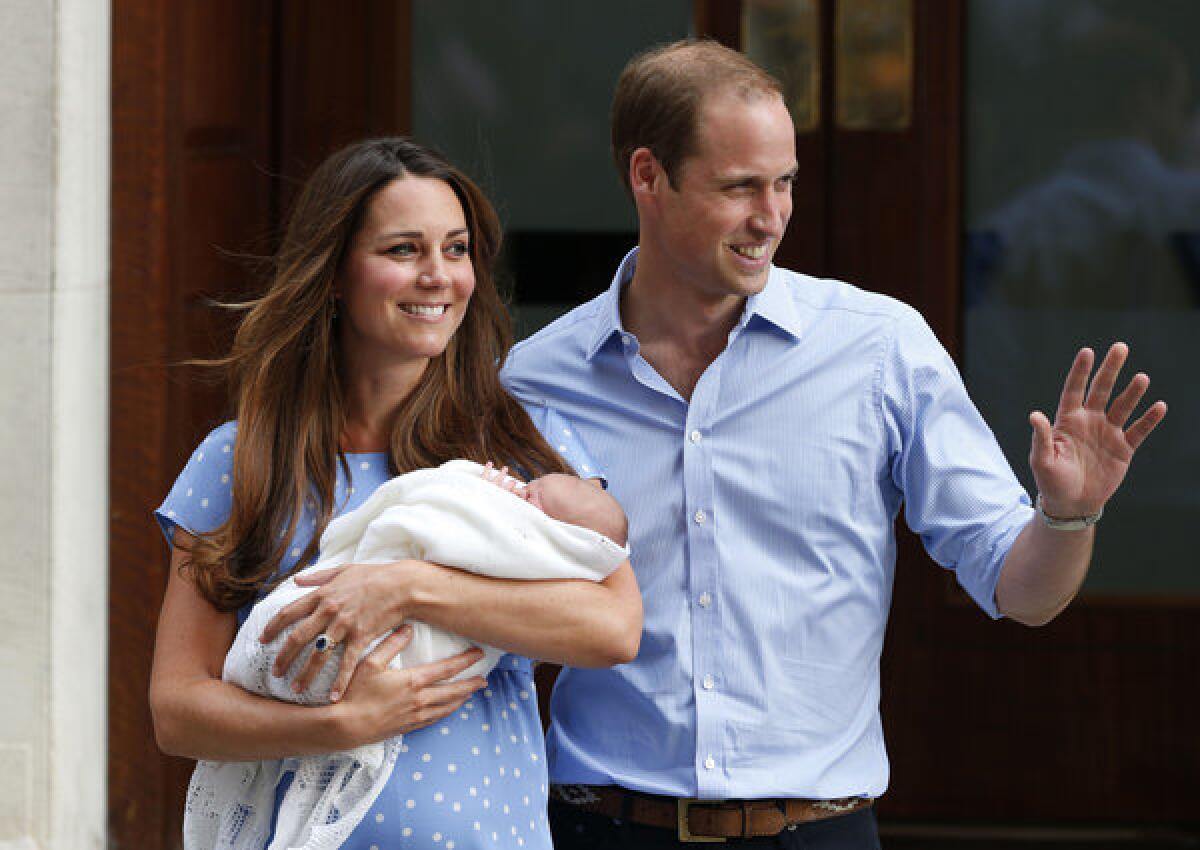Daum: Oh boy! A royal boy.

- Share via
Hearing the news Tuesday that the new heir to the British throne was a boy, my first thought was of Lady Mary Crawley, heroine of the post-Edwardian-era soap “Downton Abbey.” With no male heir left to inherit her family’s estate, it falls on her to produce a son. When she becomes pregnant, the show had even the most feminist-minded audience members hoping for a boy. And when it comes to pass, viewers were so elated that even the death of Mary’s true love, just moments after he held his son for the first time, seemed of secondary consequence.
At least Mary was only shouldering the weight of “Downton Abbey” and not every remaining vestige of British history. Throughout that history, sons were essential not just for the sake of the lineages but for the sake of their mothers’ well-being. Catherine of Aragon, the first wife of Henry VIII, produced only one surviving child, a girl, and was subsequently dumped for Anne Boleyn, the king’s mistress. Boleyn too never produced a male heir and is believed to have been executed primarily because of it.
Perhaps this is a legacy better understood by Brits than Americans. Within hours of the “It’s a boy” news, two high-profile Englishwomen publicly suggested that the Duchess of Cambridge’s delivery of a son was cause not only for celebration but relief.
FULL COVERAGE: Royal baby born
CNN’s Victoria Arbiter, who grew up partly in Kensington Palace, where her father was a press secretary to Queen Elizabeth II, and whose title at the network is “royal contributor,” offered this assessment: “This is how brilliant a royal Kate is. There are women throughout British royal family history that have panicked over not being able to deliver a boy, and here we are — Kate did it first time.”
Daily Beast and Newsweek editor Tina Brown was similarly unfettered by political correctness. On MSNBC’s “Morning Joe,” she praised Middleton for executing her royal duties flawlessly: “Once again” the duchess had done “the perfect thing” by producing a male heir.
“#Kate can do no wrong!” Brown later tweeted. “Now the royals can stop pretending they were fine with a girl 1st!”
VIDEO: Hail the Prince of Cambridge
The pile-on began almost immediately. “I’m sorry? Is it 1683?” asked the women’s news and media website the Frisky. On Jezebel, Middleton was offered a “hearty congratulations … from CNN, Victoria Arbiter, Henry VIII and everyone else out there who lacks a basic understanding of how sex chromosomes work.”
“What would have been your response if it had been a girl?” “The Daily Show’s” John Oliver demanded. “Damnation upon your cursed womb, Catherine! Burn the princess! For she has produced a baby of the weaker sex!”
OK, people, simmer down. Whether or not the Brits understand the business of X and Y chromosomes, one area in which they reliably outshine Americans is irony. Middleton’s delivery of George Alexander Louis is “perfect” not because Britain hates women (QE II has done just fine for 61 years, not to mention the many Commonwealth nations that have had female prime ministers) but because, like it or not, it makes the narrative perfect. Yes, legislation in 2011 allows the offspring of future monarchs equal access to the throne, and yes, a daughter for Kate and William might have been more exciting, as the child would have been the first female heir born under the new rules.
But consider the narrative of Middleton, a commoner whose decade-long on-again, off-again relationship with Prince William earned her the nickname “Waity Katie.” Her suitability for membership in the royal family was at times a matter of public debate. She was deemed too flighty, too pedestrian in her professional goals, too, well, common. And though the consensus is that Middleton’s uncommon grace and aplomb have more than proved she’s the right woman for the job, there’s something about producing an heir of the traditional kind, straight out of the gate, that effectively seals the deal.
And if that’s not enough of a fairy-tale ending, there’s one final twist. Kate and William, moderns as well as royals, helped usher in the era of girl heirs. That they produced a boy anyway means no one would have to deal with that change for at least three monarchies. Now that’s worthy of the word “brilliant.”
More to Read
A cure for the common opinion
Get thought-provoking perspectives with our weekly newsletter.
You may occasionally receive promotional content from the Los Angeles Times.











